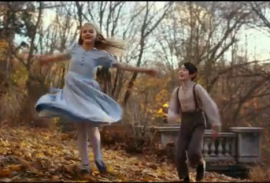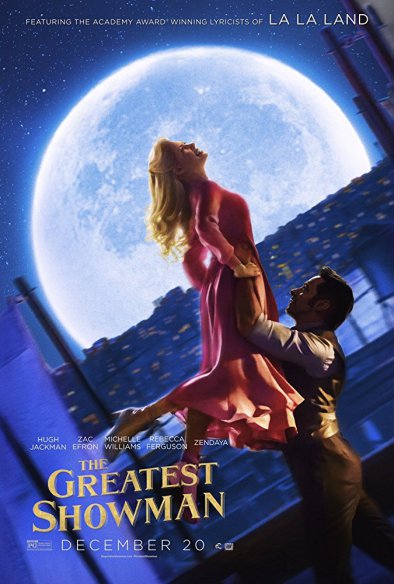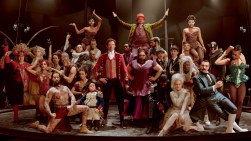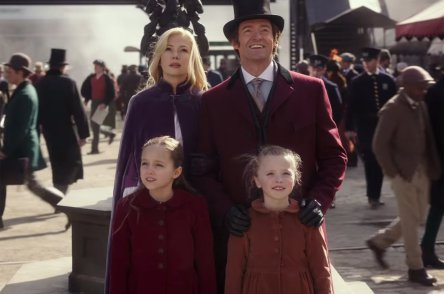
Ladies and Gents, this is the movie you’ve waited for.
This is the one movie you have to see!
The Greatest Showman, based loosely on the life of P.T. Barnum, hit theatres around Christmastime 2017 to little fanfare amidst the highly anticipated (and soundly disappointing) Episode VIII of Star Wars. I am not moved by too many movies, much less musicals. The only reason why I went to see this movie is because I took my oldest daughter on a Daddy-daughter date and she wanted to see it. (I was leaning toward the more “cerebral” Jumanji remake. Perhaps from now on I should take my movie choices more seriously.) My expectation going into this movie was low, and became lower, as we took our seats, when my daughter told me it was a musical. I had no idea that as the ending credits rolled I would be so inspired and emotionally stirred! Sitting through Star Wars: The Last Jedi, I couldn’t wait for it to be over. Watching The Greatest Showman I was wishing it would never end.
The story is of a prodigal showman, a husband and father, who was always looking for something more. What he had in front of him was never enough. His pursuit of the wrong dream almost cost him his dreams that had already come true.
The Greatest Showman begins with a hopeful music score “The Greatest Show.”
It’s everything you ever want
It’s everything you ever need
And it’s here right in front of you
The hero of our story, Phineas Taylor Barnum, took the whole movie, however, to realize that he did not have to keep reaching for the dream, because it was right in front of him. He grew up in poverty, in the lower class world of dirt and peanuts.
While helping his father one day, Phineas met a girl his age named Charity Hallett who came from a life of wealth. She was being refined in proper societal etiquette, seemingly trapped in the snobbish elitism of the upper class. While Charity endured a lesson on the proper way to drink tea, Phineas made her laugh, causing her to spit out the tea all over  the pristine table with all its settings in the proper place. Her father immediately called her over to scold her for her improper behavior. Phineas came to her defense and admitted he made her laugh. The girl’s father thanked him for his honesty and promptly slapped him. No other moment in this movie summed up the difference between the classes. Even as Phineas took the punishment originally meant for Charity, he looks up at his father, with pain in his eyes, as if to say “Aren’t you going to do something about that man striking me?” Phineas’s father merely stands there and does nothing, resigned to his station in the lower class. Yet, Phineas still dreams of a world that’s waiting for him, a world that he will design, and he inspires Charity to dream with him of a world you have to close your eyes to see.
the pristine table with all its settings in the proper place. Her father immediately called her over to scold her for her improper behavior. Phineas came to her defense and admitted he made her laugh. The girl’s father thanked him for his honesty and promptly slapped him. No other moment in this movie summed up the difference between the classes. Even as Phineas took the punishment originally meant for Charity, he looks up at his father, with pain in his eyes, as if to say “Aren’t you going to do something about that man striking me?” Phineas’s father merely stands there and does nothing, resigned to his station in the lower class. Yet, Phineas still dreams of a world that’s waiting for him, a world that he will design, and he inspires Charity to dream with him of a world you have to close your eyes to see.
Just when he reaches the bottom, resorting to theft in order just to eat, a kind gesture from a disfigured woman sparks hope in him. He takes a job with the railroad and raises his station in life. Several years later, he confidently walks up to Mr. Hallett and promises him he will give Charity a great life. Mr. Hallett assures him that his daughter would tire of the kind of life Phineas could give her and return home. Phineas takes that as a challenge.
Phineas, having moved up from abject poverty, and Charity, who stepped out of affluence, met in the middle to build their world of a million dreams. The musical score “A Million Dreams” is among the very best songs of film that poignantly captures the emotions of the moment and advances the enchanting story. While Charity builds on the dreams of their “tightrope” life together, providing simple pleasures for their daughters, Phineas quietly looks beyond what is in front of him.
“A Million Dreams” is among the very best songs of film that poignantly captures the emotions of the moment and advances the enchanting story. While Charity builds on the dreams of their “tightrope” life together, providing simple pleasures for their daughters, Phineas quietly looks beyond what is in front of him.
Disappointments push Phineas to reach his dreams through dishonest schemes. He gains a bank loan with fraudulent assets. He buys a museum and fills it with lifeless curiosities, and wax figures. Sales are sluggish, until his daughters advise him that his museum needs living things. His dreams needed life. Phineas scours the city and beyond to bring society’s outcasts and physical oddities out of the shadows, and give them a stage as equals with the rest of humanity, even while exaggerating their deformities. He helped them dream with their eyes wide open, encouraging them to live life in the open even while they breathed life into his dreams.
The curiosity show is a success even if it is a bit fake. Phineas buys a mansion just down the street from his estranged in-laws just to rub his success in their faces. But success  isn’t enough. His gate receipts are driven by the lower classes. Little Caroline Barnum’s ballet classmates remind her that she smells like “new money.” Phineas, tired of just making peanuts, wants to reach those of the high-brow society. Phineas, afraid he will not be welcomed in the cultured class, envisions something he thinks is grander than what is
isn’t enough. His gate receipts are driven by the lower classes. Little Caroline Barnum’s ballet classmates remind her that she smells like “new money.” Phineas, tired of just making peanuts, wants to reach those of the high-brow society. Phineas, afraid he will not be welcomed in the cultured class, envisions something he thinks is grander than what is in front of him. In one of the compelling subplots, Phineas hires successful playwright, Phillip Carlyle, from the upper crust. While Phineas wishes to join the upper class, Phillip is tiring of that life.
in front of him. In one of the compelling subplots, Phineas hires successful playwright, Phillip Carlyle, from the upper crust. While Phineas wishes to join the upper class, Phillip is tiring of that life.
The show’s success led to an audience with Queen Victoria, and a chance meeting with the famous European opera singer Jenny Lind. Phineas sees an opportunity to break into the upper class with a show that is “real.” He convinces her to sing for the grandest audience in the grandest concert hall in the world. She agrees. The performance is a huge success with the upper class. The music score “Never Enough” captures what is going on inside of Phineas. “All the shine from a thousand spotlights, all the stars we steal from the night sky will never be enough.” Phineas realizes that the cultured class will never accept him while he associates with the freaks in his show. He hides them in the standing room during the performance, and refuses them access to the after-party.
concert hall in the world. She agrees. The performance is a huge success with the upper class. The music score “Never Enough” captures what is going on inside of Phineas. “All the shine from a thousand spotlights, all the stars we steal from the night sky will never be enough.” Phineas realizes that the cultured class will never accept him while he associates with the freaks in his show. He hides them in the standing room during the performance, and refuses them access to the after-party.
With success in the upper class, Phineas sees opportunity to extend the dream across the country. He goes on tour with the beautiful European diva. He debases the “side show” that earned him his initial success, he neglects his family, missing events like his daughter’s ballet recital.
Performance after performance, the tour continued to rack up successes. But, in a moment alone with Phineas, the beautiful “Sweedish Nightingale” reveals that her success in America was not enough for her. She wants Phineas, too. With champagne in hand, Jenny looks seductively into Phineas’s eyes. She utters the words as if the Devil were saying “I’ve given you the world.” At that moment Phineas realizes that all the success he was pursuing, trying to be someone he’s not, left him empty. And like the prodigal son, Phineas returns home.
However, he returns to his museum burned to the ground, his home repossessed, and his wife returning to her parents just like her father predicted.
Up to this point Phineas was dreaming for himself, always reaching for something that could  never satisfy. But the winter wind blew cold. When his fleeting success burned to the ground, all that is left is what is true: his family. Nearly losing everything, he remembered who his dreams were really for. He once again pursues his wife, vowing “From now on, these eyes will not be blinded by the lights.” His dreams were right in front of him. They had already come true. And now, this is where he wants to be.
never satisfy. But the winter wind blew cold. When his fleeting success burned to the ground, all that is left is what is true: his family. Nearly losing everything, he remembered who his dreams were really for. He once again pursues his wife, vowing “From now on, these eyes will not be blinded by the lights.” His dreams were right in front of him. They had already come true. And now, this is where he wants to be.
No other movie I’ve seen, expect for The Passion of the Christ and perhaps August Rush, quickened such deep emotions and inspired such hope inside of me. (“Hope in what?” you might ask. After all, what point is there in hope if there is no object of that hope? My hope is grounded in the One who dreamed me as one of His million dreams. But, that angle on this film will have to wait for another time.) From the compelling story and sub-stories, to the fantastic soundtrack, this movie thoroughly captivated me. (Move over Rocky IV. I now have a new favorite movie soundtrack!) For a man who insists that men be masculine, this movie moved me to tears of regret and hope. Dreams are fragile and must be held gently lest we break them. I have come to realize that it is thoroughly masculine to be vulnerable in strength at times, to dream big dreams, expend great effort, yet be gentle enough to protect those dreams from myself when, in discontent, I reach for more. The Greatest Showman is a movie that I already wish I could see again for the first time.
Advertisements Share this:- More






